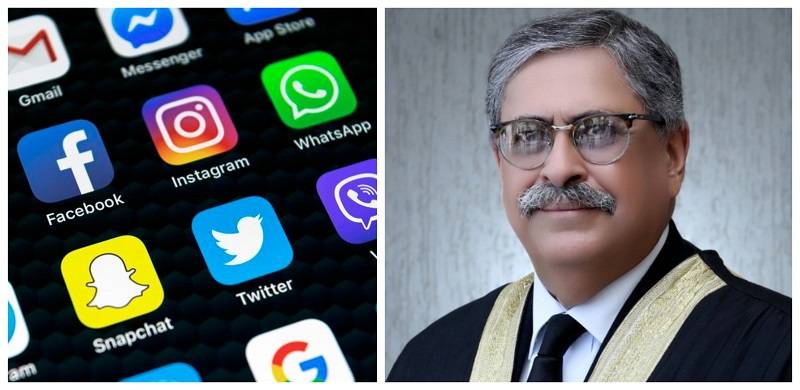
Islamabad High Court (IHC) Chief Justice Athar Minallah has remarked that freedom of expression does not protect 'hate speech or provocative speech' while formulating an opinion on the use of social media in Pakistan.
“The more a society has access to information, the better it will progress," Justice Minallah affirmed.
During Thursday's hearing, the chief justice received petitions received several briefings from amicus curiae, but granted judicial assistants until the next hearing on March 7 to submit their reports.
Last month, the IHC had requested a briefing from amicus curiae regarding the country's social media rules. The IHC has chosen to hear all cases against social media rules together and maintained that the court would only consider whether the social media rules infringed upon Article 19 of the Constitution.
“Three or four things are essential in view of Articles 19 and 19A of the Constitution. Freedom of expression should not be hate speech or provocative speech. Nothing will be left if there is no freedom of expression, so access to information is essential,” Justice Minallah stated at today's hearing.
IHC Chief Justice Athar Minallah has appointed as amicus curiae a range of digital media experts, including Sadaf Baig, Nighat Dad, Fareeha Aziz, Rafay Baloch, as well as representatives of the Pakistan Bar Council (PBC) and Pakistan Federal Union of Journalists (PFUJ).
Senior journalist Hamid Mir, one of the appointed amicus curiae, appeared before the bench today and submitted his report.
The government of Pakistan has come under international condemnation recently for restricting and prohibiting certain internet websites and social media platforms
In November, the Ministry of Information Technology and Telecommunication issued new regulation titled, 'Removal and Blocking of Unlawful Online Content (Procedure, Oversight and Safeguards) Rules, 2021', under the Prevention of Electronic Crimes Act (PECA), 2016. The regulation mandates that all social media companies operating in Pakistan would first need to abide by Pakistani laws.
Similarly, the Pakistan Telecommunications Authority banned access to TikTok, a popular Chinese social media platform last year, citing the company's failure to remove a "continuous presence of inappropriate content."
“The more a society has access to information, the better it will progress," Justice Minallah affirmed.
During Thursday's hearing, the chief justice received petitions received several briefings from amicus curiae, but granted judicial assistants until the next hearing on March 7 to submit their reports.
Last month, the IHC had requested a briefing from amicus curiae regarding the country's social media rules. The IHC has chosen to hear all cases against social media rules together and maintained that the court would only consider whether the social media rules infringed upon Article 19 of the Constitution.
“Three or four things are essential in view of Articles 19 and 19A of the Constitution. Freedom of expression should not be hate speech or provocative speech. Nothing will be left if there is no freedom of expression, so access to information is essential,” Justice Minallah stated at today's hearing.
IHC Chief Justice Athar Minallah has appointed as amicus curiae a range of digital media experts, including Sadaf Baig, Nighat Dad, Fareeha Aziz, Rafay Baloch, as well as representatives of the Pakistan Bar Council (PBC) and Pakistan Federal Union of Journalists (PFUJ).
Senior journalist Hamid Mir, one of the appointed amicus curiae, appeared before the bench today and submitted his report.
The government of Pakistan has come under international condemnation recently for restricting and prohibiting certain internet websites and social media platforms
In November, the Ministry of Information Technology and Telecommunication issued new regulation titled, 'Removal and Blocking of Unlawful Online Content (Procedure, Oversight and Safeguards) Rules, 2021', under the Prevention of Electronic Crimes Act (PECA), 2016. The regulation mandates that all social media companies operating in Pakistan would first need to abide by Pakistani laws.
Similarly, the Pakistan Telecommunications Authority banned access to TikTok, a popular Chinese social media platform last year, citing the company's failure to remove a "continuous presence of inappropriate content."

